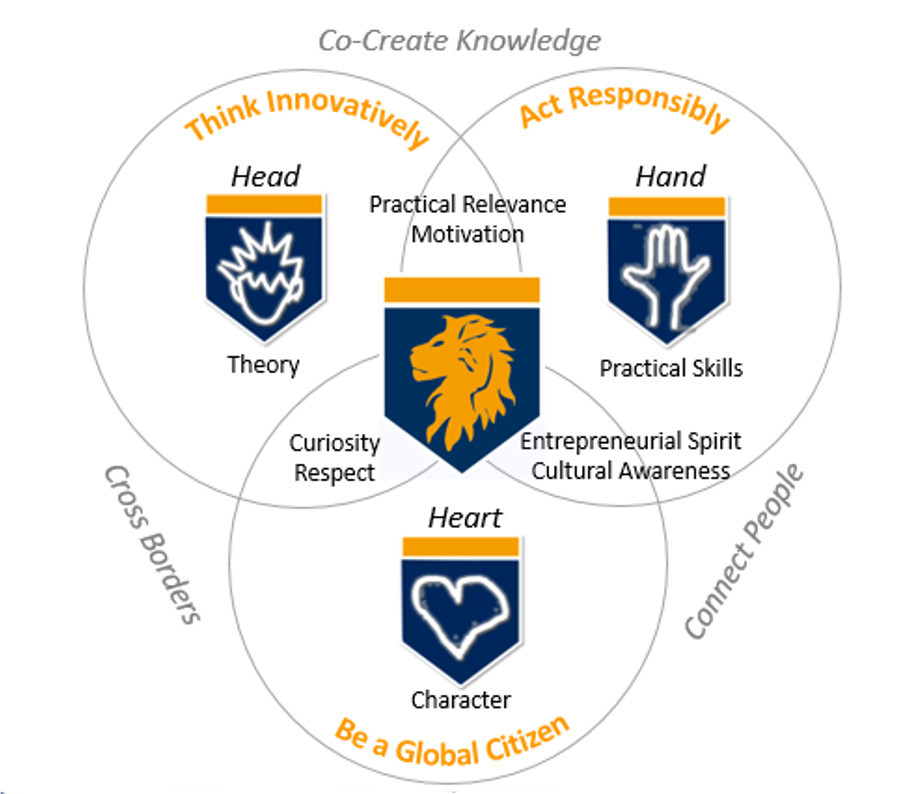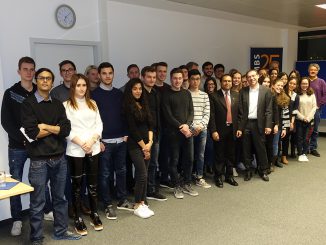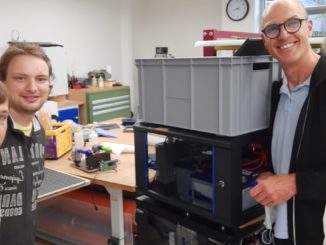25 years of Munich Business School are a good reason to think about the future, together with our most important stakeholders – our students, employees, lecturers, alumni and partners: Where are we going? Why should MBS be invented if it didn’t exist already? What are its central values? The senate of MBS unanimously passed a new vision, mission and shared values early this year after intense discussions.
If You Have Visions, You Should See a Doctor…
Former German Chancellor Helmut Schmidt once said “If you have visions, you should see a doctor.” Visions developed together do have an important function in corporate management, however: The MBS vision describes the position the university wants to reach. It characterizes an ideal target condition that provides inward and outward orientation and that specific standards must be measured against.
| Innovative – Responsible – Globally minded Munich Business School wants to be the preferred business school in Germany for globally minded, responsible and entrepreneurial personalities from all over the world in their lifelong pursuit of knowledge and personal development. |
Figure 1: The Vision of MBS
Innovative, Responsible, Globally Minded
Three core terms are at the focus of the MBS vision: innovative, responsible and globally minded. They are central terms that have characterized the university since its establishment and that are to provide an orientation and profile for the future as well:
- Innovative: As a private foundation in an environment dominated by state universities, MBS has pursued an innovative approach from the beginning. This is reflected in innovative pedagogic concepts and contents: project and team work from the first day of studies, student coaching, happiness research and conscious business are only a few examples. Many of the ideas and concepts developed in the innovative environment of MBS are now also used by other universities. That is no problem at all. After all, “if you want to be original, be ready to be copied” (Coco Chanel). We like to be the original. The environment of MBS also promotes entrepreneurial spirit among the students. There is an above-average number of them who open their own businesses or run a family firm. In the end, we need to qualify students for professions that do not exist yet in an innovative approach.
- Responsible: Entrepreneurial action and responsibility go hand in hand, and universities must also take responsibility in society. This principle is firmly established at MBS. Social Service Projects have been an integral part of the Bachelor’s program for years. We were one of the first German universities supporting the PRME (Principles of Responsible Management Education), committed in the Hochschulnetzwerk Bildung durch Verantwortung (approx. University Network Education through Responsibility) as a founding member, researching in the area of Social Entrepreneurship – to name just a few examples.
- Globally minded: Internationality was one of the central ideas of the foundation of MBS. 25 years ago, foreign languages and mandatory semesters abroad were already a fixed part of our academic training. MBS is now one of the most international business schools in Germany. More than one third of our students come from abroad to graduate at MBS. The term “globally minded” means more than just “international”, and exceeds the crossing of borders in the geographic sense: Approx. 60 nations study and work together at MBS – cultural understanding for our own as well as for foreign cultures, is a central value. Respect and open-mindedness towards other opinions, lifestyles and approaches are included in this as well.
MBS wants to be a home for people who identify with these characteristics that are also based on a specific attitude and that are a matter of the heart.
Where Are the Students, by the Way?
Those who read the vision of MBS attentively will notice that the word “students” does not appear in the vision at all. Maybe this is surprising since a strong student-orientation is one of the specific strengths of a small and personal university such as MBS. Neither does the vision speak of “training” students or “developing” managers – as many other Business Schools put it. Does MBS not do that? But of course we do. However, the lines between students and teachers blur increasingly in modern interactive higher education according to our point of view. The lecturer as a pure imparter of knowledge is a thing of the past. The lecturer turns into a moderator, bridge builder and sparring partner (Kraft, 2016).
Passion for People
Also, the student himself is not merely a passive learner but an active part of knowledge sharing with his experience and background. This not only applies to MBA programs, where participants have always learned a lot from each other under the guidance of lecturers, but to all study and advanced training programs. A special motivation is required for this, clearly exceeding the passive consumption of knowledge. MBS offers a platform for both roles to co-create knowledge. Lecturers also consider themselves life-long students here. Personal development and curiosity for knowledge play central roles for them as well.
A Matter of Perspective
The vision of MBS not only holds an internal view and describes what we want to do or what we want to enable our graduates to do. Our objectives also explicitly state that we want to achieve an external perception of being “the preferred business school”. Only with a clearly defined profile for potential students, the economy and science can we remain attractive towards globally minded, innovative and responsible personalities. MBS has established itself as a “Hidden Champion” in the university scene in several areas in the last few years. Independent studies and rankings regularly leave MBS in the top 10 of German universities, in particular when the criteria of “Internationality” or “Employability” are at the focus. Our international partner universities also value well-trained students and the quality of education at MBS. In public perception amongst the relevant target groups, though, MBS occasionally remains behind much more weakly positioned, larger competitors with higher advertising budgets. This is to change.
Closer to Business
This doesn’t mean that MBS is also increasing its advertising budget now. However, it will increase its efforts of being present in the relevant networks for practicians and scientists. Further sharpening of the research fields in alignment with the vision and mission will also contribute to this.
The internal discussion of the vision included the question of whether we wanted to be “only” the preferred university “in Germany” for our target groups or go beyond that and cover Europe or the entire world. Even as an internationally oriented university, MBS has a clearly defined home. The focus on Germany is therefore not an expression of a humble claim but rather a commitment to its location.
On a Mission…
A company’s mission describes its right to exist, its self-understanding and answers the question “Why are we here?” In other words: “What would be missing if MBS did not exist?”
| Munich Business School contributes to the economy and society by creating an inspiring academic environment in Munich that enables individuals to strive for entrepreneurial success while treating the people around them as well as our natural resources in a respectful and responsible manner.
In a holistic approach, we encourage people to fully understand and appreciate their role in and impact on society as well as to competently apply and continuously advance their business knowledge. We provide students from all over the world with an academic and professional perspective in Germany and beyond. In collaboration with our international partner universities, we enable them to gain advanced insights into the global economy and diverse cultures. Together with our company and academia partners, we create a platform for motivated and curious individuals with an entrepreneurial spirit to connect, exchange views and learn from each other. In all of our activities, we pursue practical relevance and high quality. |
Figure 2: The Mission of MBS
Opening up Opportunities
The mission takes up central subjects of the vision and puts the role of MBS as “enabler” and catalyst at the focus. The university offers an inspiring environment for personal growth and advancement of knowledge in the area of business administration. This includes further development of individual knowledge by learning as well as further development of the general knowledge status via research. The mission also makes it clear that MBS as a whole is aware of its responsibility towards economy and society and wants to live up to it. This target, sometimes called the “Third Mission” (in addition to teaching and research) is therefore an integral part of our self-perception. Other important elements of the mission are:
- Competence and character: MBS represents a broad, interdisciplinary education beyond the boundaries of individual disciplines. Only this permits development of an understanding of the complex interrelations in international economic and social context and taking over entrepreneurial responsibility.
- 100 % Munich and 100 % international: The location in Germany in general, and Bavaria and Munich in particular, is an important part of the university’s identity. Also and in particular as an international university, MBS needs a local anchor. It cannot move to any other location, not even within Germany, or be copied, without losing in quality. Only this keeps the university unique and distinctively. Internationality must not be misunderstood for randomness and the smallest common international denominator. MBS is the gate into the world from Germany for some, and the bridge from the world to Germany for others. To allow MBS to competently and credibly form this interface, it needs local and international partners alike. Not MBS alone, but only MBS with its connections to business, society and partner universities will be able to meet the claim the university has set to itself.
- Our claim is your success: As a private university with study programs that are nominally also offered in similar forms at state universities virtually for free, MBS must have a high quality claim. It is unable to compete with state universities or private competitors with expansive multi-campus strategies in price competition at all. Quality and practical relevance that convince graduates as well as employers are therefore core elements of the MBS mission.
Living up to Values
Important shared values of MBS are already named in the formulations of the vision and mission, respectively. The central values are built around the three spheres of competence of “Knowing”, “Doing” and “Being” (Baldi, 2016), symbolized by the head (for theory), the hand (for practice) and the heart (for character). These three spheres are interlocking closely. They are connected to the central elements of the vision (innovative, responsible and globally minded). Figure 3 summarizes the value system of MBS in a memorable graphical form.

MBS unites individuals with many diverse cultural, professional and academic backgrounds. The university’s culture – like the culture of any company – is not static, however. It develops every day with the behavior of every single student, employee, lecturer and alumnus. In the end, every single one of us determines every day what MBS stands for and where it is going. The vision we developed together, the mission and our values are to provide orientation in this. Our strategic initiatives, such as the international accreditation, the targeted acquisition of additional international students, the development of mission-guided research activities – to name just a few – will take us closer to our target.
Sources:
- Baldi, S. (2016). Knowing, Doing, Being – Developing Management Competencies for 2020. Retrieved June 30, 2016, from http://www.munich-business-school.de/insights/en/2016/knowing-doing-being/
- Kraft, P. (2016). Professors Reloaded: From Imparter of Knowledge to Bridge Builder, Moderator and Sparring Partner. Retrieved from http://www.munich-business-school.de/insights/en/2015/professors-reloaded-from-imparter-of-knowledge-to-bridge-builder-moderator-and-sparring-partner/




